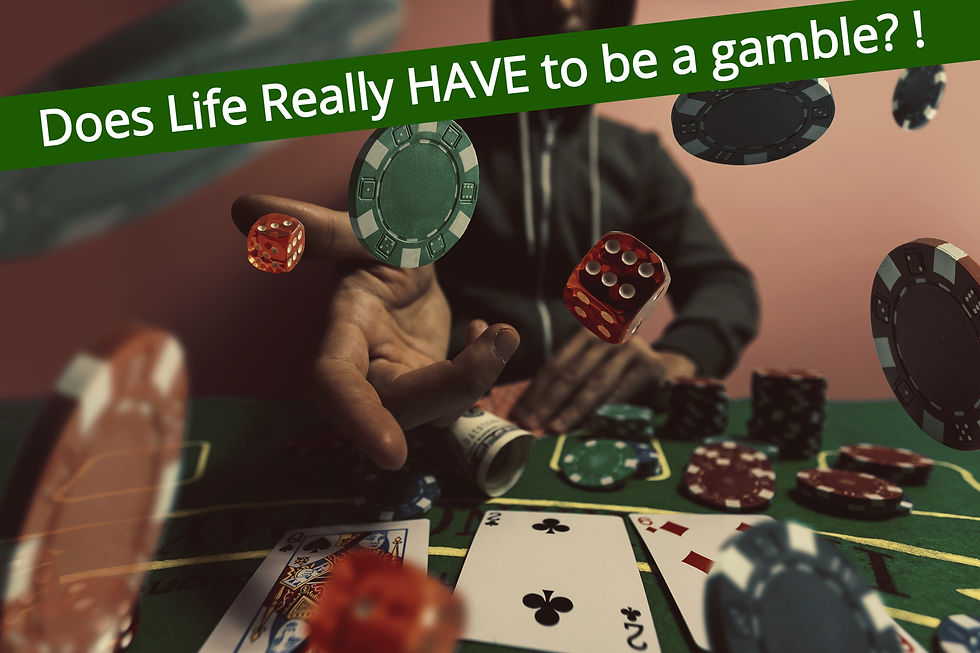Screw HOPE!
- Aug 2, 2022
- 5 min read
Updated: Sep 17, 2022
Hope is a beggar. Would you rather "HOPE" for a better future or take OWNERSHIP, generate MOTIVATION, CULTIVATE productive MINDSET, take ACTION, and CREATE YOUR OWN SUCCESS?

Hope is a good thing... Or is it? What message is our "hopefulness" sending out to the world, if not one of helplessness, despair, and a feeling that help must come from the outside? This breeds negativity and certainly does not promote motivation. Remember, hope has two brothers –disappointment and fear.
SCREW HOPE! HOPEFUL Attitude is HURTING YOU in at least two ways:
First, it assumes that luck and predisposition are more determinative of success than a mindset, determination, proactiveness, effort, and hard work.
Second, it “chains” your accomplishments/wins/possessions to anxiety and fears of losing, breeding prey/victim mindset and taking away from confidence and motivation to move forward.
Bottom line – if you feel you got “lucky,” all you do is fear that lady luck will turn
away and leave, taking her “gifts” with her. That can be a lot of thrilling fun in the casino on a Vegas getaway, but do you really want to live your life, like a gambler?

Let me give you some Food For Thought. Here's what's on the menu:
Appetizer
In the wonderful book “Outliers: The Story of Success,” Malcolm Gladwell emphasizes the difference that a culture-inspired mindset makes in “predicting” success, by contrasting a few proverbs:
“If God does not bring it, the earth will not give it.” - Russian Proverb
“Don’t depend on heaven for food, but on your own two hands carrying the load” – Chinese proverb
“No one who can rise before dawn 360 days a year, fails to make his family rich.” – Chinese proverb
Which of the above makes you feel in control and motivates you to take action? Which one makes you feel more “hopeful” a.k.a. “helpless”?
First Course
Now that you nibbled on the appetiser, let's move on to the first course
WHAT It Takes Or How Many TAKES Does It Take?

I’d like to quote Stephen A. Schwarzman from his amazingly insightful book “What It Takes. Lessons in the Pursuit of Excellence," where he shares an interesting story that demonstrates a mindset and culture of success in action:
“In 2005, The Kennedy Center hosted a China Festival. I sat next to the China’s Minister of Culture on opening night, watching a troupe of dancers and gymnasts form a human pyramid, one on top of another, climbing higher and higher to the sound of an orchestra. Each time the pyramid rose, a dancer sprinted across the stage and vaulted over it. We all wondered how long this could go on. The next dancer circled the stage and took his runup, gathering speed, and went crashing into the pyramid. Bodies flew all over the stage. If this were ballet or ice skating, the performers would just pick themselves up and move on, as if nothing had happened. Not in China. The music stopped and everybody went back to their place. They rebuilt the pyramid. The dancer took his spot and we all covered our eyes. He ran and made it over. Barely. I looked at the Minister of Culture. His expression was impassive. I asked him why he seemed so unruffled by the whole thing. ‘In China we aspire for greatness’ he told me ‘If it does not happen the first time, we simply continue until we achieve greatness.’”
Quite a lesson, isn’t it?
Second Course
Locus of control.
"Locus," a word of Latin origin, translates as “place,” “location.” Locus of control is a concept that refers to our belief that control over the outcome of the events in our lives lies either within or outside of our influence. Consequently, Locus of Control can be either internal or external.
People with an internal locus of control believe that they can influence events in their life with the actions they take and the choices they make. They will see any success or failure as a direct result of their effort, work, and dedication.

On the other hand, people with an external locus of control believe that their successes and failures result from external factors beyond their control or influence, such as luck, fate, circumstances, biases, innate talents, predispositions, etc.

The subject of locus of control has been researched quite extensively, including the correlation between internal and external locus of control and self-motivation, self-esteem, social maturity, academic success, levels of stress and depression rates, as well as the quality of life and relationships.
Research continually links strong internal locus of control to a happier and healthier life, higher success rates, better relationships, and higher levels of motivation.
HOW TO ACTIVATE INTERNAL LOCUS OF CONTROL
One of my favorite books, “Smarter, Faster, Better. The Secrets of Being Productive in Life and Business,” by Charles Duhigg, discusses an experiment conducted in 1998, in which fifth graders were given puzzles to solve, and were saluted for doing a great job afterward. Half of them were told that they must have worked really hard at these problems to have done so well, and the other half were told that they must be very smart at these problems to have done such a great job.
The praise of hard work activated the kids’ internal locus of control, reinforcing the belief that success at the task essentially resulted from something that was within their control - their willingness to work hard, their dedication, and perseverance.
On the other hand, the praise of natural intelligence or talent, activated the external locus of control, reinforcing the belief that natural smarts or talent is something that lies beyond their control. Later all students were invited to solve more puzzles, and those who were praised for their “smarts,” were much more likely to focus on easier puzzles during the second round and were less motivated to work harder. That group of children also admittedly did not enjoy the experiment. The children whose first puzzle success was credited to their hard work, on the other hand, went for harder puzzles on the next round, worked longer and performed better, and said that the experiment was fun.
Conclusion:
If we OWN our successes AND failures because we believe them to be the natural outcome of our actions and decisions, we not only do better, but we also enjoy becoming better, and thus generate motivation to keep pushing harder and harder and seeing the results improve!
Moreover, we are NOT afraid that luck or “smarts” will run out, leaving us on our own in the world, where we control nothing.
I will write more about Locus of Control, Motivation, and other interesting subjects in other posts, but for now, let’s move on to dessert...
Dessert
Hopeful equals Fearful, Proactive equals Content
In a natural continuation of our discussion of Locus of Control, it is pretty apparent that if we believe good things that come to us to be the result of fate or luck, we feel at mercy of those outside factors, never sure what the next day will bring. This breeds anxiety, uncertainty, and fears.
If, on the other hand, we feel we received something as a direct result of our own actions, we feel at ease and at peace, knowing that we have the recipe AND the ingredients to recreate and even improve the reward we received. I invite you to ponder on that for a moment – we do in fact have recipes and ingredients, it is only a matter of organizing the “kitchen” appropriately and not just warming up the junk food that appears on our doorstep uninvited. Let’s get cooking!
I am posting a lot of content on motivation, tips and tricks on how to get things done, how to create a can-do mindset, how to tackle tasks and goals, and how to take charge in your life, without becoming a control freak, so, if this is your cup of tea –sign up to stay up to date and let’s get things done!






Comments